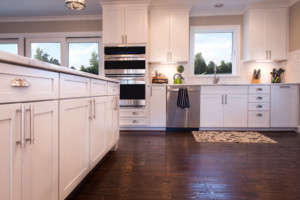 We get a lot of questions about the appropriateness of installing hardwood flooring the kitchen from our Naperville and suburban Chicago customers. While it may seem like exposure to water, spills or heavy foot traffic could be reasons to install an alternate flooring material, there’s are actually more reasons to choose hardwood flooring for your kitchen than there are reasons to avoid it.
We get a lot of questions about the appropriateness of installing hardwood flooring the kitchen from our Naperville and suburban Chicago customers. While it may seem like exposure to water, spills or heavy foot traffic could be reasons to install an alternate flooring material, there’s are actually more reasons to choose hardwood flooring for your kitchen than there are reasons to avoid it.
Whether you’re considering extending an existing wood floor, remodeling or simply updating your flooring, hardwood floors in the kitchen are a great choice for many reasons. Here are some of the reasons you should consider wood floors in your kitchen:
Wood Flooring Lends Warmth & Comfort to Your Kitchen
Kitchens are where family and guests love to congregate. Whether you’re preparing food or sitting down to enjoy a meal, people come together in the kitchen. When your budget will allow, selecting hardwood to provide a warm design element in your kitchen is worth the investment. And, the chef in your home will be especially appreciative of the comfort wood flooring provides to stand on and move around on.
Hardwood Flooring in the Kitchen is Easy to Clean
One of the main reasons hardwood is a great choice for kitchen flooring relates to how easy it is to clean. And, these days, most hardwood flooring materials are pre-treated prior to installation to help protect the flooring and make clean up simple for liquids, dirt and crumbs.
While cracks and gaps between wood planks can collect spilled items and debris, cleaning wood flooring can be conducted using various method, including a combination of either a:
- Broom
- Duster (dry mop)
- Vacuum
- Wet mop (with minimal moisture)
Kitchen Hardwood Floors: Damage, Durability & Maintenance
Hardwood flooring is durable enough to absorb the impact of dropped utensils and numerous spills with relatively minor permanent damage. While any heavy object is capable of denting a wood floor, a heavy enough object dropped on tile flooring would be just as likely to cause permanent damage, such as chipping or cracking. For this reason, it’s common to see wood floors with more elaborate or textured wood grains used in the kitchen so that dents and dings are more easily camouflaged. And, this also explains why rugs are a common fixture in the kitchen!
Alongside spills and accidents, kitchen flooring must be capable of withstanding high-traffic. However, when wood flooring is finished, or pre-treated, it can easily withstand the demands of foot-traffic, crumbs and moisture. Although hardwood flooring can develop scratches and scuffs over time, eventually when the time comes, hardwood can be sanded and refinished to its original glory.
Hardwood Floors in Your Kitchen Can Increase Your Resale Value
While tile and laminate were popular kitchen flooring choices for decades, today’s home buyer is demanding a cohesive wood floor throughout the main level of the house. Not only does a continuous surface make any floorplan appear larger, but it also lends a modern, sophisticated edge to the home.
Hardwood is a timeless material that is a great choice for kitchen flooring. While your decision to install hardwood floors in your kitchen may determine your selected wood species, texture, color and finish, the end result will bring you years of beauty, enjoyment and value.






